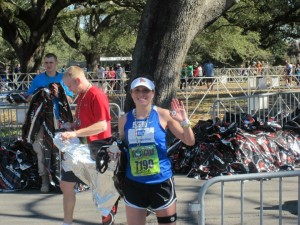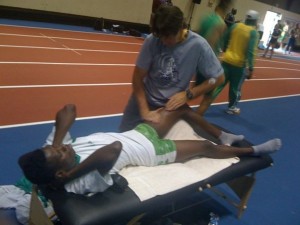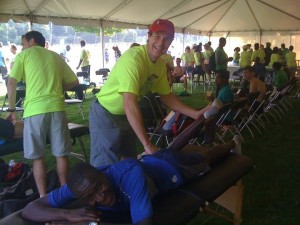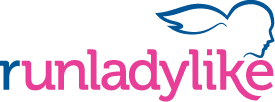Injury Prevention: Sports Massage for Runners
This week, I’m talking about injury prevention for runners, highlighting some of the most important tips and lessons I’ve learned throughout my own marathon and triathlon journey to keep me – and you – running healthy and happy. Today, I’m excited to share a strategy that often gets overlooked when we’re talking about how to prevent running injuries and/or speed recovery: sports massage.
In 2011, I was gearing up to run the Rock ‘n’ Roll New Orleans Marathon. I had a fabulous winter training season and was running stronger and faster than I’d run previously to that point. I was incredibly excited to see what I was capable of after a not-so-stellar performance at the Chicago Marathon several months earlier in 2010. About 5 weeks before the race, I started to experience some pain in my right IT band (with the worst of the pain being on the outside of my knee). For a week or so, it was manageable. It hurt a little while I was running and after I finished, but I could run through it. On my last 21-mile run before the race and before my taper period began, the pain became so intense I could only run about 15 miles before I had to force myself to stop. I broke down in tears to my coach thinking about all the hard work I’d put in and the possibility of not running the race.
In addition to icing, taking a few days off, foam rolling, etc., I went to see my sports massage therapist, Tony Adams, once a week for 4 straight weeks before the race. Not only did he help me shake out of being a complete mental head case, he worked on my muscles with deep tissue massage and stretching.
On race day, I was at the start line, didn’t feel any pain during the race and ran a personal best … which still holds as my marathon PR today.

I can personally attest that for me, sports massage was, and continues to be, a huge part of my injury prevention and recovery strategy.
But are all massages created equal?
I’m excited to have Tony with me today to share more about what we as runners and triathletes should know when it comes to sports massage. Tony is a state licensed massage therapist and 2003 graduate of the Clinical Massage Program at the Atlanta School of Massage. He is an accomplished runner, with some impressive personal bests, including a 2:58 marathon, 1:20 half marathon, 37:33 10K and 17:55 5K. Tony is breaking down everything we need to know about sports massage.

“Helping others truly is my passion. It really does not feel like work. I love working with athletes and enjoy watching them reach their goals.” ~Tony Adams
What are the most common injuries you see from runners you treat?
Since the majority of my client base is runners or triathletes, some of the most common injuries I treat are illiotibial band syndrome, Achilles tendinopathies, plantar fasciitis and common muscle strains.
What are the key benefits of getting sports massages for runners and triathletes?
The benefits of sports massage are to help improve circulation, rebalance the body’s musculoskeletal system, loosen tight muscles and reduce stress on joints. All of these factors will directly improve the ability to train at a high level, thereby improving performance.
What is the difference between a sports massage and a massage at a spa?
There are many differences in sports massage and a massage at the spa. A good sports massage therapist will be familiar with the movements and muscles involved in a particular sport and will focus the massage on the areas that need the most work. Often times, the massage will not be a “full body” massage but may focus on the lower or upper extremities. Also, some of the therapies used in sports massage can be somewhat uncomfortable at times. These techniques are used to repair injured muscles and help promote the healing process.

How often should runners actively training for events get a sports massage?
I recommend weekly or bi-weekly massages during peak training. For those on a budget, you can still see major benefits from massage by getting one per month. I always recommend pre- and post -event massages for half marathons, marathons, Ironman races, ultras, etc.
If people can’t afford to get a sports massage that regularly, what do you recommend they do? Is there anything we can do at home to help prevent injury?
For those who can’t afford regular massages, I always recommend consistent stretching and icing. Self-massage tools such as The Stick, foam rollers, lacrosse balls, etc. can supplement regular massage. I call this “maintenance work.” It’s not as fun as running, but it can help improve performance as much as speed work, diet and rest. I have many clients who have incorporated cross-training, yoga and pool running into their routine. I feel that all of the above can help prevent injury. The biggest problem that I see with injury is that most people do not address them soon enough.
What should athletes look for when trying to choose a good sports massage facility or therapist?
When looking for a good sports massage therapist, rely on running stores and other runners. In my opinion, a good therapist will be active, preferably a runner or at least understand and/or experience many of the injuries that they will address with clients. It is important they are able to relate to what you might be experiencing both physically and emotionally. They should also be willing to work with other sports-minded health care professionals, such as chiropractors, physical therapists, orthopedic doctors, podiatrists and athletic trainers.

When should runners go see a doctor vs. a sports massage therapist?
I would recommend seeing a doctor over a sports massage therapist if you are experiencing a wound, swelling or a pain level of 10+ on a scale of 1 to 10 during weight bearing activities. I would always recommend trying to see an orthopedic doctor or general practitioner who focuses on sports-related injuries.
What are the best stretches you recommend to runners to help prevent injury?
I typically utilize the active, isolated stretching method for clients. There are several books and Web sites with excellent diagrams and information on stretching. I always recommend stretching after runs, especially long or hard workouts. I would start with the larger muscle groups and work to the smaller ones. Most people seem to neglect stretching glutes and IT bands. Stretching these areas is vital in reducing injury and maintaining good balance.
What is your best tip for people training for a half marathon, marathon or triathlon when it comes to injury prevention?
My best tip for injury prevention would be consistent stretching and post-run ice therapy.
How can people connect with you?
I work with a great team at Georgia Sports Chiropractic. If you are in or near the Atlanta area, you can schedule a massage online at www.georgiasportschiropractic.com. New clients can receive a $15 discount on a 60-minute massage when scheduling during the month of April. I can also be reached for consultation or scheduling at tkaadams@hotmail.com. I’m also on Facebook and LinkedIn under Tony Adams.
Did you miss Part 1? Read it now: Injury Prevention for Runners: A Week-Long Series + The Basics
Ready for Part 3? Read it now: Injury Prevention: Running in the Right Shoes
Ready for Part 4? Read it now: Friday FITspiration: A Runner Overcomes Injury to Run Stronger
Ready for Part 5? Read it now: Injury Prevention: Yoga for Runners
Do you ever get sports massages? How often do you go? Have they helped you prevent or recover from injury?



Comments
I had a similar experience with my IT band and got almost immediate relief from a sports massage which I scheduled in part thanks to advice from you, rUnladylike!
So glad sports massage has been working for you Christina!!!
Great advice. I tend to get massages more reactively then proactively but I do use several items such as the stick and a TP therapy kit to keep my muscles loose
Kevin, I am in the same boat with you. I find myself always calling Tony once I have an ache or pain. I need to get into a better habit of doing it the other way around 🙂
Get post! I finally just got my first sports massage. And just from the one time I finally found out what is causing my problems! Here I am thinking it’s my knee and hamstring and it’s my hips making those parts hurt! Big learning experience for me.
This is so true. The hip tends to be the culprit of everything. As runners, they are often so tight. I learned the same thing from Tony when I first started seeing him.
I love, love, love that you sought out expert advice for this in addition to sharing how it helped you. Incredibly refreshing in today’s internet culture. Anyway, I am so bad at this stuff – never had a sports massage, don’t own a foam roller – and this post gives me good reason to start thinking about things outside of the training plan. I did have some IT/imbalance issues prior to my first marathon that I had corrected by a sports chiropractor. It was so worth the time to understand why things hurt and what to do about them.
I’m so glad you found this info helpful, Kimberly. All week experts will be joining me as part of the series. On Wednesday, I’ll have a shoe expert from Brooks Running talking about being in the right shoe to prevent injury. On Sunday, the owner of Tough Love Yoga will be on the blog to help share advice on restorative yoga for runners. I’ll also be featuring an awesome and inspiring story from a fellow runner as part of Friday FITspiration who overcame an injury and came back stronger. I hope you’ll keep stopping by this week! Glad you are inspired to do a few things to keep yourself injury-free!!!
I got my first sports massage a few days before MCM last year (I was having tightness issues in my legs) and it helped me immensely! I got another last week before the Cherry Blossom Ten MIler, and again, the benefits of sports massage far outweigh the decision to forgo it. Highly recommended!
Thanks for sharing your experience, Dave! Hope the Cherry Blosson Ten Miler was fun!
Great post! I was given a gift certificate for a sports massage and will finally be getting my first one in a couple weeks, 2 days after my next big race. I was advised not to do it before, since I don’t know how my body will react. I am definitely going to ask the massage therapist if they are an athlete (specifically, if they’re a runner) and get some more info on them! Thanks for the insight on that.
I hope you enjoy your first massage. Hopefully you won’t still be too sore 2 days after your race. If you are really sore, you may want to move it back a few days. I like to get a sports massage early in the week before a race (Tuesday if the race is on Sunday). Good luck!
I have never had a sports massage, but I fully intend to after my half marathon this weekend! Thank you so much for this awesome series. Injuries are by far the biggest worry as an athlete 🙂
Good luck this weekend, Beka! I’ll be cheering you on virtually and can’t wait to hear how you do! Glad you’re finding the series helpful so far! xo
Reading this post reaffirmed for me the importance and benefits of bi-monthly massages. I am lucky enough to have an massage therapist that specializes in deep tissue sport massage as well as recovery and stretching techniques. My massage therapist also teaches me about all the muscles in my legs, back and upper body that affect my running and overall health. It’s important for me to have a massage therapist that educates me as she works on massaging my muscles. Keep up the great posts!! Thank you:)
[…] you an athlete? Do you get regular sports massages? Injury Prevention: Sports Massages via […]
can anyone help? I am running tough mudder on saturday and have very stiff legs from training. Wouldit makes sense to have a sprts massage 3 days before or is this too close? I have never had one before
3 days before should be just fine. You wouldn’t want to do a sports massage the day before a race, especially if it is not something that is part of your regular routine.
[…] articles: How massages will boost your performance Injury prevention: How sports massages help A rub down rub […]
[…] http://www.runladylike.com/2013/04/09/injury-prevention-sports-massage-for-runners/ […]